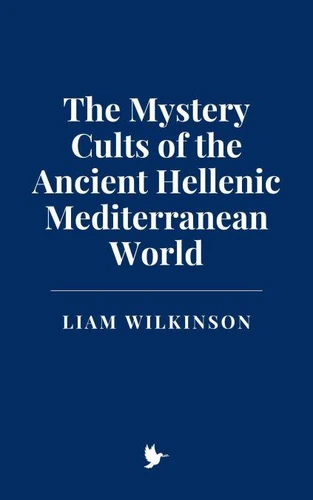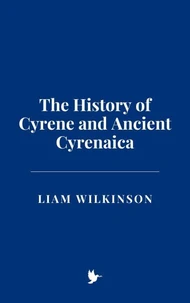The Mystery Cults of the Ancient Hellenic Mediterranean World
Par :Formats :
Disponible dans votre compte client Decitre ou Furet du Nord dès validation de votre commande. Le format ePub est :
- Compatible avec une lecture sur My Vivlio (smartphone, tablette, ordinateur)
- Compatible avec une lecture sur liseuses Vivlio
- Pour les liseuses autres que Vivlio, vous devez utiliser le logiciel Adobe Digital Edition. Non compatible avec la lecture sur les liseuses Kindle, Remarkable et Sony
 , qui est-ce ?
, qui est-ce ?Notre partenaire de plateforme de lecture numérique où vous retrouverez l'ensemble de vos ebooks gratuitement
Pour en savoir plus sur nos ebooks, consultez notre aide en ligne ici
- FormatePub
- ISBN8227744111
- EAN9798227744111
- Date de parution17/01/2025
- Protection num.pas de protection
- Infos supplémentairesepub
- ÉditeurBig Dog Books, LLC
Résumé
The mystery cults of the ancient Hellenic Mediterranean world present a profound and enigmatic aspect of religious life that flourished alongside the public, state-sanctioned polytheism of Greece and Rome. These secretive religious groups, characterized by exclusive initiation rites, esoteric teachings, and a focus on personal salvation, have intrigued scholars and the curious alike for centuries.
Their allure lies not only in their hidden practices but also in their cultural and spiritual resonance, which reflected broader social, philosophical, and religious trends of the ancient Mediterranean. Mystery cults emerged during a period when the traditional pantheon of gods-epitomized by the Homeric epics and civic cults-was being questioned and redefined. While public religion focused on collective rituals, civic duties, and maintaining the favor of the gods for the prosperity of the polis, mystery cults offered something distinctly different: a deeply personal and transformative religious experience.
This divergence raises critical questions about the nature of human spirituality, the relationship between the individual and the divine, and the reasons why secretive, initiatory traditions gained traction within such a rich and well-established religious framework. The term "mystery cult" is derived from the Greek word mysterion, meaning "secret rite" or "hidden knowledge." The central feature of these cults was the initiation process, which was essential for participation in their sacred rituals.
Initiates, known as mystai, swore oaths of secrecy that ensured the sanctity of their experiences. The content of these rituals remains elusive, as initiates were forbidden to reveal the details. However, through archaeological evidence, literary references, and comparative studies of myths and iconography, scholars have pieced together fragments of these ancient practices. For instance, texts such as the "Homeric Hymn to Demeter" and inscriptions from Eleusis provide tantalizing glimpses into the Eleusinian Mysteries, one of the most prominent cults in the Greek world.
Their allure lies not only in their hidden practices but also in their cultural and spiritual resonance, which reflected broader social, philosophical, and religious trends of the ancient Mediterranean. Mystery cults emerged during a period when the traditional pantheon of gods-epitomized by the Homeric epics and civic cults-was being questioned and redefined. While public religion focused on collective rituals, civic duties, and maintaining the favor of the gods for the prosperity of the polis, mystery cults offered something distinctly different: a deeply personal and transformative religious experience.
This divergence raises critical questions about the nature of human spirituality, the relationship between the individual and the divine, and the reasons why secretive, initiatory traditions gained traction within such a rich and well-established religious framework. The term "mystery cult" is derived from the Greek word mysterion, meaning "secret rite" or "hidden knowledge." The central feature of these cults was the initiation process, which was essential for participation in their sacred rituals.
Initiates, known as mystai, swore oaths of secrecy that ensured the sanctity of their experiences. The content of these rituals remains elusive, as initiates were forbidden to reveal the details. However, through archaeological evidence, literary references, and comparative studies of myths and iconography, scholars have pieced together fragments of these ancient practices. For instance, texts such as the "Homeric Hymn to Demeter" and inscriptions from Eleusis provide tantalizing glimpses into the Eleusinian Mysteries, one of the most prominent cults in the Greek world.
The mystery cults of the ancient Hellenic Mediterranean world present a profound and enigmatic aspect of religious life that flourished alongside the public, state-sanctioned polytheism of Greece and Rome. These secretive religious groups, characterized by exclusive initiation rites, esoteric teachings, and a focus on personal salvation, have intrigued scholars and the curious alike for centuries.
Their allure lies not only in their hidden practices but also in their cultural and spiritual resonance, which reflected broader social, philosophical, and religious trends of the ancient Mediterranean. Mystery cults emerged during a period when the traditional pantheon of gods-epitomized by the Homeric epics and civic cults-was being questioned and redefined. While public religion focused on collective rituals, civic duties, and maintaining the favor of the gods for the prosperity of the polis, mystery cults offered something distinctly different: a deeply personal and transformative religious experience.
This divergence raises critical questions about the nature of human spirituality, the relationship between the individual and the divine, and the reasons why secretive, initiatory traditions gained traction within such a rich and well-established religious framework. The term "mystery cult" is derived from the Greek word mysterion, meaning "secret rite" or "hidden knowledge." The central feature of these cults was the initiation process, which was essential for participation in their sacred rituals.
Initiates, known as mystai, swore oaths of secrecy that ensured the sanctity of their experiences. The content of these rituals remains elusive, as initiates were forbidden to reveal the details. However, through archaeological evidence, literary references, and comparative studies of myths and iconography, scholars have pieced together fragments of these ancient practices. For instance, texts such as the "Homeric Hymn to Demeter" and inscriptions from Eleusis provide tantalizing glimpses into the Eleusinian Mysteries, one of the most prominent cults in the Greek world.
Their allure lies not only in their hidden practices but also in their cultural and spiritual resonance, which reflected broader social, philosophical, and religious trends of the ancient Mediterranean. Mystery cults emerged during a period when the traditional pantheon of gods-epitomized by the Homeric epics and civic cults-was being questioned and redefined. While public religion focused on collective rituals, civic duties, and maintaining the favor of the gods for the prosperity of the polis, mystery cults offered something distinctly different: a deeply personal and transformative religious experience.
This divergence raises critical questions about the nature of human spirituality, the relationship between the individual and the divine, and the reasons why secretive, initiatory traditions gained traction within such a rich and well-established religious framework. The term "mystery cult" is derived from the Greek word mysterion, meaning "secret rite" or "hidden knowledge." The central feature of these cults was the initiation process, which was essential for participation in their sacred rituals.
Initiates, known as mystai, swore oaths of secrecy that ensured the sanctity of their experiences. The content of these rituals remains elusive, as initiates were forbidden to reveal the details. However, through archaeological evidence, literary references, and comparative studies of myths and iconography, scholars have pieced together fragments of these ancient practices. For instance, texts such as the "Homeric Hymn to Demeter" and inscriptions from Eleusis provide tantalizing glimpses into the Eleusinian Mysteries, one of the most prominent cults in the Greek world.























